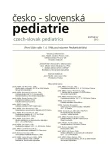-
Medical journals
- Career
Role of matrix metalloproteinases in wound healing after congenital cleft lip surgery
Authors: K. Bláha 1; J. Borský 2; R. Průša 1; A. Štekláčová 1; E. Otoupalová 1; R. Matějová 1; M. Pechová 1; K. Kotaška 1; T. Dostálová 3
Authors‘ workplace: Ústav klinické biochemie a patobiochemie UK 2. LF a FN Motol, Praha, přednosta prof. MUDr. R. Průša, CSc., Klinika plastické chirurgie FN Královské Vinohrady, Praha , přednosta doc. MUDr. M. Tvrdek, CSc., Dětská stomatologická klinika UK 2. LF a FN 1
Published in: Čes-slov Pediat 2012; 67 (1): 11-14.
Category: Original Papers
Overview
Objective:
The purpose of this study was to compare the aspects of wound healing after cleft lip surgery within one week of age and wound healing after surgery within 2–4 months of age. We examined extracellular matrix proteins involved in wound healing, especially concentrations of matrix metalloproteinases in tissue removed during surgery.Material and methods:
30 tissue samples (16 boys and 14 girls) were removed during surgery within one week of age 17 or within 2–4 months of age 13. Proteins were extracted in cacodylic buffer for 24 hours in temperature 2–8 °C. Total protein concentrations were examined using modification of Lowry method. Samples were examined using ELISA kit Amersham Biotrak Activity Assay (GE Healthcare UK) for detection of MMP-1, MMP-2, and MMP-3 concentrations.Results:
MMP-1: early surgery 0.017 ± 0.023 µg/g of protein (mean ± SD), 2–4 months surgery 0.028 ± 0.026 µg/g. MMP-3: early surgery 0.200 ± 0.142 µg/g, 2–4 months surgery 0.155 ± 0.093 µg/g. Concentrations of MMP-2 were after dilution above working range at 12 µg/l in all tested samples.Conclusion:
No significant differences in concentrations of protein and MMPs, MMP-1 and MMP-3 according to time of surgery were found.Key words:
matrix metalloproteinases, cleft lip, wound healing
Sources
1. Broughton G, Janis J, Attliger Ch. The basic science of wound healing. Plast Reconstr Surg 2006 Jun; 117 (Suppl 7): 12S–34S.
2. Le NT, Xue M, Castelnoble LA, Jackson CJ. The dual personalities of matrix metalloproteinases in inflammation. Front Biosci 2007 Jan; 112 : 1475–1487.
3. Visse R, Nagase H. Matrix metalloproteinases and tissue inhibitors of metalloproteinases: structure, function and biochemistry. Circ Res 2003; 92 (8): 827–839.
4. Edvin SS, Romeo R, Rathnasabapathy CM, Athaydel N, Amant DR, Subramanian MG. Protein dinase C stimulates release of matrix metalloprotein kinase-9 and tissue inhibitor of metalloproteinase-1 by human decidual cells. J Matern Fetal Neonatal Med 2002 Oct; 12 (4): 231–236.
5. Letra A, Silva RA, Mezenes R, Astolfi CM, Shinohara A, de Souza AP, Granjiero JM. MMP genepolymorphisms as contributors for cleft lip/palate: Association with MMP3 but not MMP1. Arch Oral Biol 2007 Oct; 52 (10): 954–960.
6. Sesso R, Franco MC. Abnormalities in metalloproteinase pathways and IGF-I axis: a link between birth weight, Hypertension, and vascular damane in childhood. Am J Hypertens 2010 Jan; 23 (1): 6–11.
7. Chen W, Fu X, Ge S, Sun T, Sheng Z. Differential expression of matrix metalloproteinases and tissue-derived inhibitor of metalloproteinase in fetal and adult skins. Int J Biochem Cell Biol 2007; 39 (5): 997–1005.
8. Brown NL, Yarram SJ, Mansell JP, Sandy JR. Matrix metalloproteinases have a role in palatogenesis. J Dent Res 2002 Dec; 81 (12): 826–830.
9. Li WJ, Chen W, Fu XB, Zhu RZ. Expression of matrix metalloproteinases and their inhibitors in fetal skin and their biological significance. Zhuongo Wei Zhong Bing Ji Jiu Yi Xue 2006 May; 18 (5): 303–306.
10. Dang CM, Beanes SR, Lee H, Zhang X, Soo C, Ting K. Scarless fetal wounds are associated with an increased matrix metalloproteinase-to-tissue-derived inhibitor of metalloproteinase ratio. Plast Reconstr Surg 2003; 111 (7): 2273–2285.
Labels
Neonatology Paediatrics General practitioner for children and adolescents
Article was published inCzech-Slovak Pediatrics

2012 Issue 1-
All articles in this issue
- Prevalence and type of anemia in IBD children at the time of diagnosis
- Role of matrix metalloproteinases in wound healing after congenital cleft lip surgery
- The concentration of lead in blood and allergic sensitization in children of pre-school age from two regions of Slovakia
- Thymidin kinase – suitable marker for diagnostics and follow up in childhood leukemia
- Increase of pollinosis among school youth in town and in countryside in recent 20 years (1988–2009)
- Xp21 microdeletion syndrome: Severe cause of adrenal insufficiency, muscular dystrophy, plasma lipid disorder and developmental delay in a two-month-old child with failure to thrive
- Ligneous conjunctivitis, hydrocephalus and protracted respiration infections in a patient with plasminogen deficit
- The effect of thumb sucking on splanchocraniums development in childhood
- Influenced pain by children dental treatment
- When to search for inhereted thrombophilia risk factors in children?
- In-patient care in Czech Pediatrics – further prospect
- Experience in long-term non-acute care of children in the Strančice Institution
- Czech-Slovak Pediatrics
- Journal archive
- Current issue
- Online only
- About the journal
Most read in this issue- When to search for inhereted thrombophilia risk factors in children?
- Influenced pain by children dental treatment
- The effect of thumb sucking on splanchocraniums development in childhood
- Thymidin kinase – suitable marker for diagnostics and follow up in childhood leukemia
Login#ADS_BOTTOM_SCRIPTS#Forgotten passwordEnter the email address that you registered with. We will send you instructions on how to set a new password.
- Career

